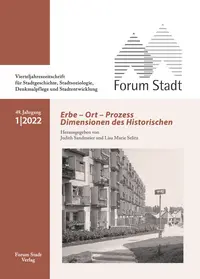The Municipal Heritage Plan Bavaria – new paths in urban heritage conservation - Project in cooperation with the Bavarian State Conservation Office (BLfD)
Project
The aim of the research project is to develop concepts and practices for historically informed, participatory and sustainable planning practices for urban structures and to enhance the theoretical foundations of such practices. This happens in close cooperation with the Bavarian State ConservationOffice (BLfD).
The research takes place within the framework of the “Municipal Heritage Plan”, an instrument currently being developed and administered by the BLfD that aims at the consensus-oriented preservation and development of urban heritage. This new informal planning tool responds to the challenges faced by towns and villages to preserve town centers, neighborhoods, significant streets or important urban quarters in times of structural and demographic change. It offers help to further develop and revitalize these areas while integrating participatory approaches to urban heritage conservation.
A prerequisite for urban development, based on the potentialities within historical structures, is a qualified inventory of the complex interrelationships that have manifested themselves in the built environment through an interplay of the geographical-topographical localization, and the political, economic and socio-cultural environment. These values in terms of building culture and heritage conservation are recorded, strengths and need for action specifically named, in order to integrate heritage conservation concerns into a citizen-oriented planning practice. The aim is to empower municipalities to concertedly factor in aspects of urban heritage conservation into processes of urban planning. Essential for the success is the way in which values and development potentials are highlighted, how citizens and local decision-makers are involved in decision-making processes and how municipal options for action with regard to the urban cultural heritage are pointed out.
The KDWT project accompanies the work of the State Office on a scientific level with the aim of expanding and evaluating the conceptual basis of the new planning tool. Among other things, nationally and internationally comparable approaches of formal and informal planning frameworks are researched as well as the theoretical conditions of participatory approaches to urban heritage conservation in order to test their transferability to the specific Bavarian conditions of heritage conservation and protection.
You will find more details on the planning instrument in the publication series of the Bavarian State Office (German language only):
Cooperation partners
University of Bamberg, KDWT:
Prof. Dr. Gerhard Vinken: Chair of Heritage Sciences
Lisa Marie Selitz, M.A.: Research Associate (KDWT), Division of Heritage Conservation
Bavarian State Conservation Office (BLfD):
Dr. Thomas Gunzelmann: head conservator / deputy chief inspector for the documentation of settlement forms and cultural landscapes, BLfD, Bamberg office
Dr. Gerhard Ongyerth: research consultant for the documentation of settlement forms and cultural landscapes as well as urban conservation, head of the department for research in urban conservation, BLfD, Bamberg office
Judith Sandmeier, M.A.: research consultant, BLfD
Conferences

Ort und Prozess. Verhandlungen von Erbe vom urbanen bis zum ländlichen Raum, Online-Tagung, in cooperation with the department participation und urban heritage of the Bavarian State Conservation Office (BLfD), 26 and 27 November 2020.
Fachdialog: Stadterneuerung und Denkmalpflege. Geschwister oder Antipoden? Eine Kooperation des KDWT, des Fachgebiets Stadtumbau+Ortserneuerung der TU Kaiserslautern und des Bayerischen Landesamt für Denkmalpflege zu Gast bei der Stadt Regensburg, Regensburg, April 2019.
Vorträge aus dem Projekt
- Sandmeier, Judith / Selitz, Lisa Marie: „Engagement für die historische Stadt. Einsatz und Wirkung am Beispiel des KDK Viechtach“.
Expertenworkshop Bürgerbeteiligung in städtebaulicher Denkmalpflege und Stadtentwicklung, KDWT / Bayerisches Landesamt für Denkmalpflege, June 2017.
Publications
Books

Sandmeier, Judith / Selitz, Lisa Marie (Hgg.): Erbe – Ort – Prozess. Dimensionen des Historischen. In: Forum Stadt. Vierteljahreszeitschrift für Stadtgeschichte, Stadtsoziologie, Denkmalpflege und Stadtentwicklung 49 (1), 2022. Editorial und Inhaltsverzeichnis online verfügbar unter: https://forumstadtverlag.de/2022/2022-1/
Articles
Sandmeier, Judith / Selitz, Lisa Marie: Das Kommunale Denkmalkonzept Bayern. Städtebauliche Denkmalpflege als integrierte Praxis. In: Uwe Altrock et al. (Hg.): Stadterneuerung in Klein- und Mittelstädten (Jahrbuch Stadterneuerung). Wiesbaden 2020, S. 155–180 (https://doi.org/10.1007/978-3-658-30231-3_7 ).
Sandmeier, Judith / Selitz, Lisa Marie: Expertenworkshop „Bürgerbeteiligung in städtebaulicher Denkmalpflege und Stadtentwicklung“. In: Denkmalpflege Informationen 168, 2017, S. 89–91.
Gunzelmann, Thomas / Sandmeier, Judith / Selitz, Lisa Marie / Vinken, Gerhard: Das »Kommunale Denkmalkonzept«. Eine Perspektive für mehr Eigenverantwortung von Kommunen und Bürgergesellschaft im System Denkmalpflege. In: Die Denkmalpflege 75 (1), 2017, S. 20–26.
Vinken, Gerhard / Selitz, Lisa Marie: Kommunales Denkmalkonzept als Chance. Ein Beitrag zu einer historisch informierten Stadtplanung. In: Bayerisches Landesamt für Denkmalpflege (Hg.): Das Kommunale Denkmalkonzept. Den historischen Ortskern gemeinsam gestalten und entwickeln (Denkmalpflege Themen, 8), München 2017, S. 24–26. Open-access-Ressource online verfügbar unter: https://www.blfd.bayern.de/mam/information_und_service/publikationen/denkmalpflege-themen_kommunales-denkmalkonzept_2017.pdf

